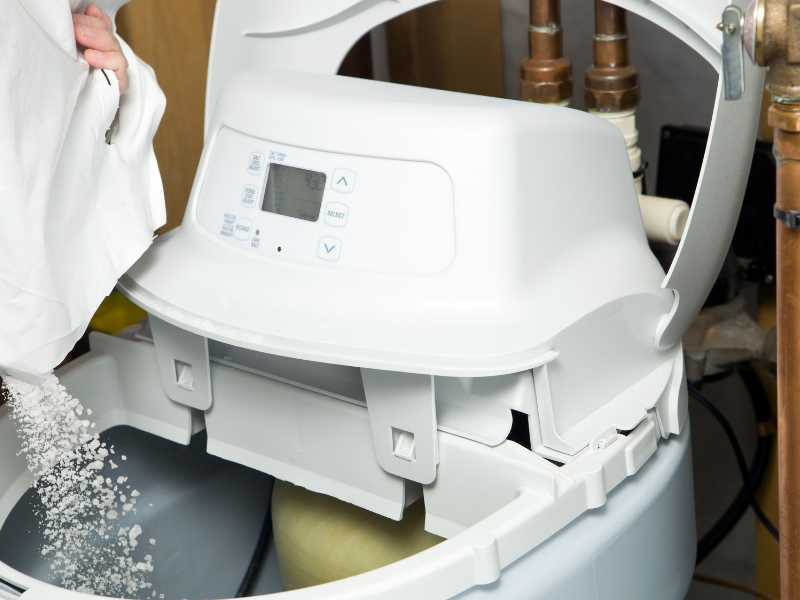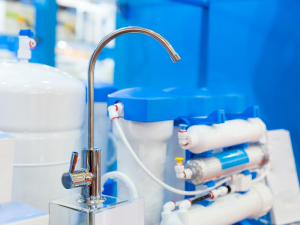Water is a necessary resource for life, but not all water is created equally. Hard water contains higher levels of minerals such as magnesium and calcium. These minerals can impact water’s taste, and smell, and lead to a whole host of issues for homeowners.
Thankfully, there are several types of water softeners available to help mitigate these problems.
In today’s guide from our team at Clover Contracting, we will take a closer look at the different kinds of water softeners and the systems that are used to soften water.
Types of Water Softeners
If you live in an area with hard water, you may be familiar with the problems it can cause. Hard water can leave behind mineral deposits, make your skin and hair feel dry, and cause your clothes to fade faster.
Fortunately, there are several different water softeners that can help mitigate these issues.
While assessing the various water softener types, there are three major categories to consider: ion exchange, salt-free, and magnetic/electronic.
Ion exchange systems are the most common, using resin beads charged with sodium ions to replace the minerals in the water that cause hardness.
Salt-free systems use a special resin to neutralize the minerals in the water without removing them.
Magnetic or electronic systems use a magnetic or electronic field to alter the structure of the minerals in the water.
Fun Fact from the Experts
Did you know that water softening was first discovered by accident? In the early 20th century, a scientist named Harriette Chick noticed that the laundry in certain areas of England seemed to wear out faster than in others. She discovered that the cause was hard water, and her research led to the development of the first water-softening systems.
Today, water softeners are used in homes and businesses around the world to help protect plumbing, appliances, and clothing from the damaging effects of hard water.
Water Softening Options for your Home or Business
Easily the most popular approach to water softening is with an ion exchange system. With an ion exchange system, hard water flows through a resin tank containing tiny resin beads that are charged with sodium ions.
As the hard water moves through the resin tank, the magnesium and calcium ions in the water are swapped for sodium ions, effectively softening the water.
When the resin beads become saturated with calcium and magnesium ions, the system goes through a regeneration cycle, during which salt water is used to recharge the resin beads.
Another option for water softening is a salt-free system. In a salt-free system, the hard water moves through a media bed containing a special resin that neutralizes the minerals in the water without removing them. This type of system is often used as an alternative to traditional ion exchange systems for people who want to avoid adding salt to their water.
A third approach to water softening is a magnetic or electronic system. These systems use a magnetic or electronic field to alter the structure of the minerals in the water, making them less likely to stick to surfaces. Though these systems are less effective than ion exchange or salt-free systems, they can be a good choice for people who don’t want to deal with the maintenance and expense of a traditional water softener.
Alternative or Different Types of Water Softeners
In addition to the three main varieties of water softeners, there are several alternative or different types of systems available. These include:
- Reverse Osmosis: Reverse osmosis systems use a semi-permeable membrane to remove minerals and other impurities from water. While reverse osmosis systems aren’t technically water softeners, they can be effective at removing minerals that cause hard water.
- Template-Assisted Crystallization: Template-assisted crystallization systems use a special resin to convert the minerals in hard water into tiny crystals that are less likely to stick to surfaces. This type of system is often used as an alternative to traditional ion exchange systems for people who want to avoid adding salt to their water.
- Chelation: Chelation systems use a chemical called EDTA to bind with the minerals in hard water, effectively neutralizing them. Chelation systems are less common than other softeners, they can be a good choice for people who want to avoid adding salt to their water.
What are the 5 Types of Water Softeners Systems?
Once you’ve decided on the style of water softener you want, you’ll need to choose a specific system.
The various water softener system types include:
Portable Systems: Portable systems are small and easy to move, making them a good choice for renters or people who move frequently.
Whole-House Systems: Whole-house systems are larger and more permanent and are designed to soften water throughout your entire home.
Dual-Tank Systems: Dual tank systems have two resin tanks, which allow for continuous soft water even during regeneration cycles.
Demand-Initiated Regeneration Systems: Demand-initiated regeneration systems use sensors to determine when the resin tank needs to be regenerated, which can help to conserve water and salt.
Time Clock Regeneration Systems: Time clock regeneration systems regenerate the resin tank on a set schedule.
Final Thoughts
Water softeners can help homeowners avoid the negative effects of hard water, such as mineral buildup and damage to plumbing and appliances. Whether you choose an ion exchange, salt-free, or magnetic/electronic system, there are options available to fit your needs and budget.
Additionally, there are alternative or different types of systems like reverse osmosis, template-assisted crystallization, and chelation that can also be effective in treating hard water.
Trust the Experts
At Clover, we understand the importance of clean and soft water for your home and family. Our experienced professionals can help you choose the best water softener for your specific needs, and our installation and maintenance services will ensure that your water softener is functioning properly and efficiently. Don’t let hard water cause unnecessary damage to your home and belongings.
Contact Clover Contracting today to schedule a consultation and find the solution for all of your plumbing issues.
Our team of experts can help you choose the best option for your home and ensure that it is installed and maintained properly. Protect your home and family from the damaging effects of hard water with a water softener.


